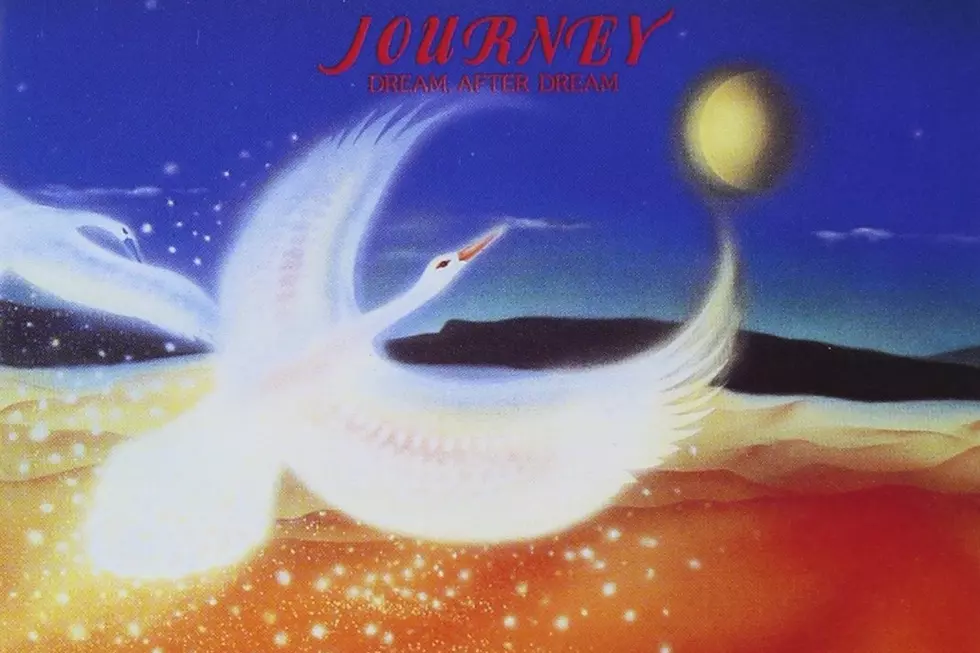
When Gregg Rolie Said Goodbye on Journey’s ‘Dream, After Dream’
Gregg Rolie's studio work with Journey ended with 1980's Departure, a triple platinum-selling commercial splash that gave the band its first-ever Top 10 appearance on the Billboard album chart. He appeared on Captured, a 1981 document of the huge tour in support if that album and then disappeared into family life.
Or at least that's the way it's popularly understood.
Rolie actually played a key role in a little-heard studio recording before Captured arrived, as Journey soundtracked a Japanese fantasy film called Yume, Yume No Ato for director Kenzo Takada. Often left out of the band's official discography, Dream, After Dream served as a final look back at their original early-'70s fusion-based sound.
Rolie co-wrote four of this soundtrack's nine songs, while adding keyboard asides that recalled past glories without easing into rote familiarity. The results are a far more fitting conclusion for Rolie, who co-founded the group with guitarist Neal Schon after they both exited Santana.
Vocals, as they often did over the course of Journey's first three albums, took a backseat to more expanded musical thoughts. Schon was unusually understated (in particular on "Moon Theme" and "When the Love Has Gone"), yet Dream, After Dream emerged as the most adventurous Journey album before singer Steve Perry's arrival. The rumor, persistent still, was that Rolie wasn't on board with Journey's subsequent drift toward the pop chart on songs like 1979's "Lovin', Touchin', Squeezin'" and 1980's "Any Way You Want It." His last studio album before leaving may have felt like a kind of rebuttal, but Rolie insisted he held no grudges.
"Everyone thinks it was because Perry came in and started singing all the leads," Rolie told Rolling Stone in 2019. "I was spread so thin with all these keyboards parts and singing leads, he was a welcome sight to me – and he could sing like a bird! It wasn't too hard to figure out. I was never against it.
"I still wanted to sing, but that kind of fell by the wayside," he added with a laugh. "That's another story."
Recording at Tokyo's Shinanomaki Studios immediately after the Departure tour wrapped, Rolie was back in his jam-band element again: "Sand Castles" is positively Pink Floyd-ian, while the boldly episodic "Destiny" remains Journey's longest recorded song. In this way, Dream, After Dream completed a circle.
Listen to Journey's 'Little Girl'
Unfortunately, the album arrived on Dec. 10, 1980, as an import-only Japanese release. Instead of sending Rolie off on a high note, these free-form explorations were largely forgotten.
"Little Girl" – one of three Dream, After Dream songs with vocals, along with "Destiny" and "Sand Castles" – was tucked away as the B-side of the "Open Arms" single in 1982. Anyone who bothered to turn over the 45 found a bold melding of musical eras, with elements of muscular prog coupled with Perry's more accessible approach at the mic. Schon completes things with one of his best-ever solo turns.
"It was the most Journey-esque number on the album," Rolie said in the liner notes for Journey's career-spanning Time3 set. "I almost wish we had saved it for one of our albums."
By then, however, the group had long since moved on with new keyboardist Jonathan Cain. Together, they became arena-sized superstars, selling million and millions of records. Rolie spent a few years decompressing before quietly restarting his music career with an eponymous solo debut in 1985, but he never expressed any regrets over his decision.
"I didn't touch an instrument for two years," Rolie said in 2011. "I'd been on the road for 14 years and built two bands. I had just had my fill of it, and I wanted to change my life. So, I made an effort to do so. When I think about it now, the family that I have might be my best accomplishment."
Aside from work with his longtime solo band, Rolie boasted high-profile stints in the Storm (featuring other former members of Journey), Abraxas Pool (with fellow ex-Santana bandmates) and with Ringo Starr's All Starr Band. Carlos Santana's group reunited for a celebrated new studio album, too.
But Dream, After Dream somehow stayed in the margins. Journey included only a single song from the soundtrack – "Little Girl," again – on 1992's Time3. "Little Girl" was also included as a bonus track on the 2006 reissue of Departure and 2011's Greatest Hits 2, to no avail.
Most people still think Journey's discography moves from Departure to Captured – and that Rolie left because he was jealous of Perry's increasing role.
"I really just didn't want to do that anymore. I didn't want to travel anymore. I disliked it. Steve – no one got along too well with Steve," Rolie told Keith Langerman in 2009, with a laugh. "I don't like to be pinpointed quite that way. But yeah, he made it an easier choice, that's for sure. It was time to go. For both our sakes, for the band and myself. It was just time."
Rockers Whose Bands Tried to Erase Them
You Think You Know Journey?
More From Ultimate Classic Rock









